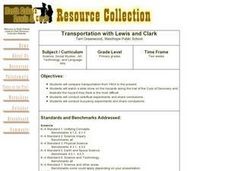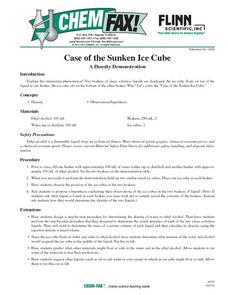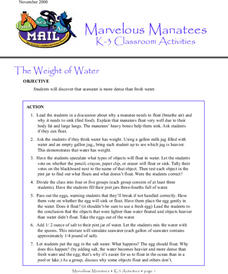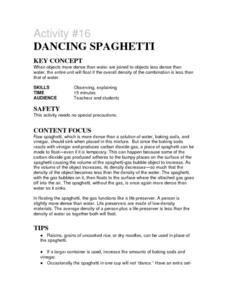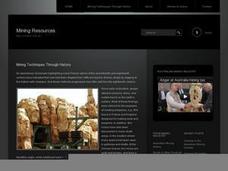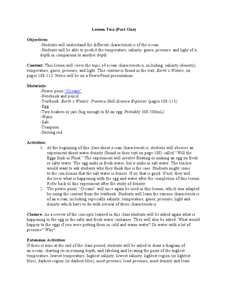Curated OER
Transportation with Lewis and Clark
Students listen to a PowerPoint presentation and complete a Venn diagram comparing the methods of transportation in the early 1800s with today's transportation. They experiment with the buoyancy of keelboats.
Curated OER
Density and Buoyancy Experimental Design
Learners must plan, design, and conduct an experiment that answers the scientific question: "Come up with a question that addresses the factors (variables) of the water and its effect on whether an object floats or sinks."
Curated OER
What are Properties of Wood?
Students use hands on scientific observation to determine characteristics of wood. They work directly with the materials and record their observations. Students test if wood absorbs water, if wood floats or sinks, and if all wood...
Reach Out!
Paper Clip Sailing
Students explain that some things can float on top of water because of what we call "surface tension." They see that if something happens to disturb these water molecules from tugging on each other, the skin-like surface breaks up.
Curated OER
Salinity
Learners define and discuss salinity, conduct classroom experiment to determine salinity of water sample by using hydrometer, record predictions, and demonstrate understanding of how salinity influences object's ability to float in water.
Curated OER
Science: Different Levels of Density
Young scholars observe experiments in density and describe the results. In the experiment, milk, corn syrup, and oil are added in different orders to three glasses, while one other glass contains only water. As objects are dropped into...
Curated OER
Chemistry: The Case of the Sunken Ice Cube
Students examine a density demonstration involving ice cubes and beakers of water and alcohol. After observing how one ice cube floats in water and sinks in alcohol, they determine which mixture of the two would suspend the ice cube in...
Curated OER
Three Methods of Heat Transfer
Pupils participate in a variety of experiments designed to illustrate types of heat transfer including conduction, convection and radiation. They complete worksheets as an assessment of the experiments.
Curated OER
Activity #8 Simulation of Oil Spills
Young scholars conduct an experiment to simulate an oil spill and identify the characteristics of oil in water. They evaluate the effectiveness of various cleanup methods. They discuss the how to clean up an oil spill, and what causes...
Curated OER
The Weight of Water
Learners participate in an experiment about the weight of water. They work together to discover that seawater is more dense than fresh water. They also determine which objects float and sink.
Curated OER
Activity #16 Dancing Spagehetti
Learners experiment with floating the spaghetti, the gas functions like a life preserver. Pupils comprehend that a person is slightly more dense than water. They comprehend that a life preservers are made of low-density materials. The...
Curated OER
Science: Exploration Tubs
First graders develop skills of scientific inquiry. They determine which objects float and which sink.
Curated OER
The Buoyancy Factor
Students examine why some objects float in water while others sink and the ability of something to float does not depend entirely on its weight. Archimedes' principle is introduced and buoyant force is discussed. Practice calculations...
Curated OER
Science Lesson #2
Fourth graders explore and experiment with objects that float to see if they float differently in salt water or fresh water. After the experiment, they write a paragraph in their science journal explaining how fresh water and ocean water...
Curated OER
Trash Traits: Marine Debris, Litter, Ecology, Oceans
Students perform experiments to examine whether trash can float, blow around, or wash away. The effects of these characteristics on the presence of marine debris in the environment are then discussed.
Curated OER
Marine Debris
Students will perform experiments to examine if debris will float, or blow in the wind. They discuss the effects of these characteristics on marine debris.
Curated OER
Froth Flotation
Sixth graders experiment with the froth flotation process to extract metallic ore by using basic chemicals and equipment in the science classroom.
Curated OER
How Do We Breathe?
Students study the structure of the lungs. In this lung structure lesson, students use lung models to study the structure of lungs and experiment to measure the amount of air in the lungs.
Curated OER
Physical Properties Of Coal
Students examine and identify the observable properties of coal. After a lecture/demo, students perform a simple experiment. They observe samples of coal and record data in an organized manner.
Curated OER
Water Density
Students identify and analyze the concept of density using the formula, density equals mass divided by volume. They review the differences in salinity levels of the ocean and note that the changes in density are caused by wind and...
Curated OER
Condiment Diver: The World's Simplest Cartesian Diver
Middle schoolers explain what density is in their own words. In this physics lesson, students perform the condiment experiment and explain why some float and some sink. They share their findings in class.
Curated OER
Water and Ice
Students explore the states of matter. For this physical science lesson, students observe what happens to water when it freezes and record observations. Students then observe ice when it melts and record observations.
American Chemical Society
Changing the Density of a Liquid - Heating and Cooling
During a unit on density, pupils ponder whether or not temperature affects this property. By carefully inserting blue cold water and yellow hot water into a room-temperature sample, they will see the answer. Make sure to have done the...
Curated OER
Lesson tow
Students study the ocean and its characteristics. In this oceans lesson students complete a lab activity and are able to predict temperature of certain depths.


